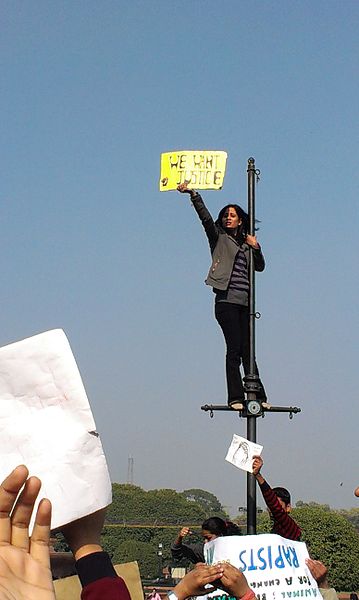International Women’s Day is both a cellebration and a call to action.
I watched a few days ago on the BBC the documentary “India’s Daughter”, that contains some the worst violence and discrimination that still exists against women:
“India’s Daughter is a documentary film directed by Leslee Udwin and is part of the BBC’s ongoing Storyville series. The film is based on the 2012 Delhi gang rape and murder of Jyoti Singh, a 23-year-old woman who was a physiotherapy student. The film was planned to be broadcast on International Women’s Day, 8 March 2015, in India on NDTV 24×7 and in UK on BBC Four, whilst being simultaneously broadcast in Denmark, Sweden, Switzerland, Norway and Canada.
“On 1 March 2015, it was revealed that the film-makers had interviewed one of the rapists, when he was being held in the Tihar jail… The Indian government blocked its broadcast in India by obtaining a court order on 4 March 2015. BBC said it would comply with the order. In UK however, the BBC brought forward the transmission to 4 March….
…”One of the convicted rapists serving life imprisonment, Mukesh Singh, was interviewed for the documentary. He said in the interview “When being raped, she shouldn’t fight back. She should just be silent and allow the rape. Then they’d have dropped her off after ‘doing her’, and only hit the boy.” He later added, “A girl is far more responsible for rape than a boy … A decent girl won’t roam around at nine o’clock at night … Housework and housekeeping is for girls, not roaming in discos and bars at night doing wrong things, wearing wrong clothes.”
“A. P. Singh, a defence lawyer in the case, was shown saying, “If my daughter or sister engaged in pre-marital activities and disgraced herself and allowed herself to lose face and character by doing such things, I would most certainly take this sort of sister or daughter to my farmhouse, and in front of my entire family, I would put petrol on her and set her alight.” Asked later if he stood by those comments, he insisted that he did.” (Wikipedia)
It is clear that such attitudes towards women still exist in the world and are not exclusive to any one country. Female genital mutilation, abortion of female fetuses, the glass ceiling, domestic violence, sex slaves and trafficking, and so many other forms all speak of deeply rooted forms of violence.
However, it is true that women have been achieving positions of influence and responsibility in politics, industry, science and society in general, showing that the first pioneers of female education such as Laura Cereta in the Renaissance and Mary Wollstonecraft, author of A Vindication of the Rights of Woman in the XVIII century, were right to state that women would be as capable as men if only they were allowed access to education.
The call to action against violence is not about punishing the men who commit acts of aggression, although laws in that respect remain important, but to consider the need to create a nonviolent society as a whole, since the prejudices and discrimination present in some males is actually passed on by mothers who are also party to a certain mindset about the subservient role of women.
Nonviolence in education means that both male and female children acquire early on the values and strategies needed to build a different world, where all individuals have the same rights and opportunities. Wherever we are, whatever we are doing, let us ask ourselves if there is something we can do to to promote active nonviolence through education and through our participation in civil society.










